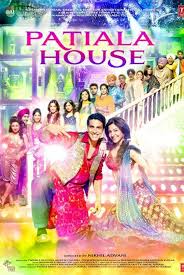Breaking boundaries between family expectations and personal dreams is never easy, and when it happens under the bright lights of international cricket, it gets even harder. Set in the vibrant streets of London, this film brings to life the emotional turmoil of athletes, their families, and the cultural weight that often comes with representing your community on a global platform. Starring Akshay as a talented but conflicted cricketer, and supported by Anushka, Rishi, and Dimple, the movie takes the sports-drama genre to an emotional core, offering more than just a story of victory on the field.
The story revolves around Parghat Singh Kahlon, a talented cricketer who once shone on the international stage but is now caught between the expectations of his family and his suppressed dreams. His career comes to a halt after facing backlash from his community, leading him to quit cricket under his father’s pressure. His father, played by Rishi, is a proud patriarch who, despite loving his son, holds rigid views about cultural values and doesn’t believe that his son should be playing for a country that isn’t their motherland. As Parghat, or Gattu as he’s affectionately called, lives a life bound by these restrictions, his passion for the game never truly fades. What follows is an emotional journey where Gattu must not only fight for his place on the cricket field but also his right to choose his own path.
Akshay, in the role of Gattu, delivers a restrained and emotionally nuanced performance. His portrayal of a man torn between the love for his family and the love for cricket is heartfelt. He captures the internal conflict with subtlety, especially in scenes where he has to suppress his anger or disappointment. One of the most powerful scenes in the film is when Gattu finally confronts his father, where Akshay masterfully balances both vulnerability and defiance, making it one of the film’s emotional highlights. Rishi, as the strict father, brings a depth to his role that adds emotional weight to the story. His rigid stance comes from years of hardship and personal sacrifice, and Rishi brings this out effectively, making his character more than just a villainous patriarch.
Dimple’s role as Gattu’s mother, Simran, is understated yet pivotal. She represents the emotional glue of the family, and her quiet support for her son contrasts with her husband’s forceful personality. Anushka, as the love interest and a strong character in her own right, adds a refreshing dimension to the story. She isn’t just there to be the supportive girlfriend but stands as Gattu’s equal, helping him reclaim his identity. Their chemistry feels organic, and she plays a significant role in encouraging Gattu to break free from his family’s emotional chains.
The direction by Nikkhil Advani ensures that the film remains tightly focused on the emotional and familial conflicts, while also giving enough screen time to the thrilling aspects of cricket. Nikkhil doesn’t go overboard with the sports drama, instead, he keeps the audience invested in Gattu’s personal journey, using cricket as a backdrop rather than the entire story. He builds tension well, particularly in the moments where Gattu inches closer to a return to cricket, and the stakes are high both on and off the field. The contrast between the high-pressure moments of a cricket match and the quiet, often tense family confrontations makes for compelling storytelling.
The cinematography by Santosh Thundiyil captures London beautifully, shifting between the bustling urban settings and the quiet emotional moments of the Kahlon household. The cricket sequences are shot with great energy, giving a sense of realism to the on-field action. The use of slow-motion shots during key moments in the matches adds drama without feeling forced, heightening the emotional stakes in the game. One of the most memorable sequences is when Gattu steps back onto the cricket field for the first time after a long hiatus, with the camera capturing both the intensity of the crowd and his personal fear and excitement.
The film’s music by Shankar-Ehsaan-Loy is an effective blend of uplifting tracks and emotional ballads. Songs like “Dil Ne Jise” reflect Gattu’s internal struggle and journey, while more upbeat tracks like “Ziddi Dil” add an energetic flair to the scenes where Gattu begins training again. The background score is subtle yet effective, never overpowering the scenes but enhancing the emotional undertones. The music ties well into the film’s themes of self-discovery, family loyalty, and the bittersweet nature of chasing dreams.
Costume design plays a significant role in shaping the film’s cultural tone. Gattu’s transformation is subtly reflected in his changing attire—from simple, traditional clothing to the more modern cricket gear as he starts to regain control over his life. The family’s traditional Punjabi outfits highlight the cultural tensions within the film, especially in contrast to Gattu’s journey to break free from these conventions.
If there is one drawback, it’s that the film can feel slightly formulaic at times. The narrative arc of the underdog rising against the odds, along with the familial resistance, is something we’ve seen before in many sports dramas. However, the film’s emotional depth and the strong performances from the cast help it stand out. Gattu’s journey is more about breaking free from emotional shackles than winning a cricket match, which gives the film an edge over typical sports stories.
Overall, this film delivers a strong message about the importance of following your own dreams, regardless of the cultural or familial pressures that may stand in the way. It’s not just about cricket; it’s about identity, freedom, and family love. Akshay delivers one of his most nuanced performances in recent years, backed by a talented cast that brings both the warmth and the tension of family relationships to life. For anyone who enjoys sports dramas with a deeper emotional core, this is a must-watch. It’s a film that will resonate with anyone who’s ever had to choose between their family’s expectations and their personal ambitions, offering a heartfelt and rewarding viewing experience.







